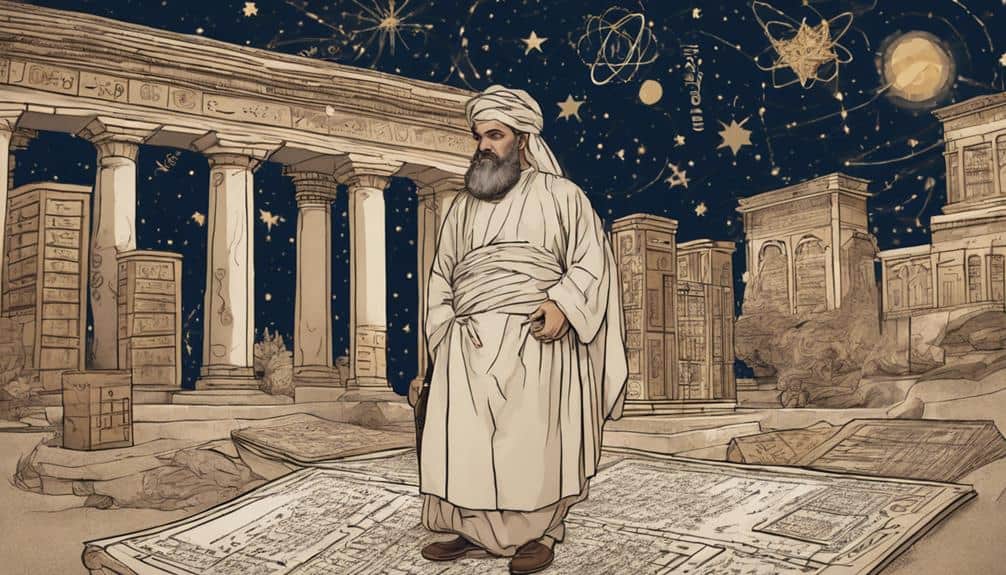Discover how Al-Khwarizmi, working at the House of Wisdom in Baghdad around 820 CE, revolutionized mathematics by introducing systematic methods for solving equations, laying the groundwork for modern algebra.
Dive into the story of his genius and learn how his groundbreaking algorithms continue to influence mathematics and science today.
The Life of Al-Khwarizmi
Born in the region of Khwarazm around 820 CE, Al-Khwarizmi's life was marked by groundbreaking contributions as an astronomer at the House of Wisdom in Baghdad. As a Muslim scholar, his work in mathematics, particularly algebra, revolutionized the field. Al-Khwarizmi authored the influential book 'Al-Jabr', which systematically addressed solutions for linear equations and quadratic equations. This book laid the groundwork for the subject we now know as algebra, earning him the title 'Father of Algebra.'
At the House of Wisdom, Al-Khwarizmi didn't just limit himself to theoretical pursuits; he engaged in practical problem-solving that had tangible applications. His methods for solving equations weren't only innovative but also highly systematic, making them accessible and replicable. This approach made his work foundational for future generations of mathematicians both in the Muslim world and beyond.
Al-Khwarizmi's contributions extended beyond algebra; he played a pivotal role in disseminating the Hindu-Arabic numeral system, which notably advanced mathematical computation. His legacy in Baghdad has left an indelible mark on the field of mathematics, bridging ancient knowledge with future discoveries.
Understanding Al-Khwarizmi's life offers invaluable insights into the origins of algebra and its profound impact on the world.
The House of Wisdom

Al-Khwarizmi's groundbreaking work in mathematics was nurtured in the intellectually vibrant environment of the House of Wisdom, where scholars from diverse cultural backgrounds collaborated to translate and preserve ancient Greek texts, fostering unparalleled advancements in various scientific fields.
Located in Baghdad during the Islamic Golden Age, the House of Wisdom served as a beacon of knowledge and a hub for intellectual exchange. You'd find scholars deeply engaged in the translation of ancient texts, which acted as a catalyst for the development of new ideas and methodologies.
This atmosphere of collaborative efforts was instrumental in Al-Khwarizmi's achievements. He spent a significant part of his life at the House of Wisdom, where the confluence of minds from different cultures provided a fertile ground for innovation. The scholars' dedication to preserving and expanding upon ancient knowledge led to significant breakthroughs in mathematics, science, and philosophy.
In this context, Al-Khwarizmi's contributions weren't isolated incidents but part of a broader tapestry of intellectual progress. The House of Wisdom's emphasis on rigorous academic pursuit and the seamless exchange of ideas allowed Al-Khwarizmi to thrive and make his lasting impact on mathematics.
Birth of Algebra

In the transformative landscape of mathematical thought, the systematic methods for solving equations that Al-Khwarizmi introduced in his seminal work 'Al-Jabr' marked the true birth of algebra. Al-Khwarizmi's approach was revolutionary, emphasizing the importance of unknown variables and using abstraction and symbols to represent them. This abstraction allowed for greater flexibility and generalization in mathematical problem-solving.
Before Al-Khwarizmi, mathematical problems were often solved using specific numerical examples. Al-Khwarizmi's innovative methods shifted the focus to more general solutions. He provided clear, systematic methods to solve equations, especially quadratic equations, which were a significant leap forward. By introducing these problem-solving techniques, he laid the groundwork for what would become a cornerstone of modern mathematics.
His work also introduced symbolic representation, a key element in algebra. These symbols allowed mathematicians to handle complex equations more efficiently and paved the way for future advancements. Al-Khwarizmi's contributions didn't just solve individual problems; they established a framework for approaching a wide range of mathematical challenges.
Through 'Al-Jabr', Al-Khwarizmi's systematic methods and problem-solving techniques have continued to influence the field, underscoring the profound impact of his work on the birth and evolution of algebra.
Solving Quadratic Equations

As you explore Al-Khwarizmi's contributions to solving quadratic equations, you'll uncover a methodology that transformed mathematical problem-solving. His systematic approach and the introduction of unknown variables were revolutionary, providing a foundation for modern algebra.
Al-Khwarizmi's Quadratic Methodology
Discover the brilliance of Al-Khwarizmi's quadratic methodology, where isolating variables and simplifying equations become the keystones to unraveling intricate algebraic problems.
Al-Khwarizmi's approach to solving quadratic equations was groundbreaking, laying a foundation for modern algebra. He introduced a systematic methodology that involved isolating variables and reducing equations to simpler forms, making them more manageable. This process involved recognizing and manipulating unknown variables, which were central to his problem-solving techniques.
By breaking down quadratic equations into more straightforward components, Al-Khwarizmi effectively demystified the complexities of algebra. His methodology didn't just stop at isolating variables; it also included completing the square and understanding the geometric implications of equations. This thorough approach allowed for a deeper understanding of the mathematical relationships involved.
Al-Khwarizmi's work was a significant leap forward in mathematical problem-solving, as it provided clear, logical steps that could be followed systematically. By revolutionizing how quadratic equations were approached, he made it possible for future mathematicians to build on his methods and develop even more sophisticated techniques. His contributions laid the groundwork for algebra as we understand it, marking a pivotal moment in the history of mathematics.
Historical Impact on Algebra
Al-Khwarizmi's systematic methods for solving quadratic equations didn't just advance algebra; they fundamentally transformed it by introducing a structured approach that emphasized the manipulation and understanding of unknown variables. His innovative approaches allowed mathematicians to explore equations more deeply, leading to the evolution of algebra as a distinct mathematical discipline.
By focusing on unknown variables, Al-Khwarizmi's methods provided a clear framework for solving equations that was both logical and replicable. This breakthrough laid the foundation for modern algebraic techniques, where solving quadratic equations became a central skill. His work was revolutionary because it shifted the mathematical community's perspective, highlighting the importance of a methodical approach to problem-solving.
The historical impact of Al-Khwarizmi's contributions can't be overstated. His techniques not only influenced contemporary mathematicians but also set the stage for future advancements in algebra. By formalizing the process of solving quadratic equations, he guaranteed that these methods would be taught, studied, and refined over centuries.
Al-Khwarizmi's legacy is evident in the way algebra is approached today, underscoring his pivotal role in the development of this essential mathematical discipline.
Algorithm Innovation

When you explore Al-Khwarizmi's contributions, you'll notice how his step-by-step procedures for solving linear equations transformed mathematical problem-solving. These algorithms didn't just solve equations; they established the foundational principles of modern computing.
Defining Step-by-Step Solutions
In the field of mathematical innovation, Al-Khwarizmi's introduction of step-by-step solutions for linear equations marks a pivotal advancement that transformed problem-solving methodologies. His algorithmic approach provided a systematic method that allowed you to solve mathematical equations with unprecedented efficiency. Al-Khwarizmi's algorithms broke down complex linear equations into manageable steps, enabling more straightforward and understandable solutions.
By implementing these step-by-step solutions, Al-Khwarizmi didn't just solve equations; he revolutionized problem-solving methods. His systematic method laid the foundation for future advancements in computational mathematics. Imagine tackling a complex equation—Al-Khwarizmi's approach made it possible to break it down into smaller, more digestible parts, simplifying the process.
The efficiency of Al-Khwarizmi's algorithms has also been instrumental in the development of modern algebraic methods. His work ensured that mathematical equations could be approached in a logical, organized manner, allowing for consistent and reliable results. This was a significant leap forward from the less structured methods that preceded him.
Foundations of Modern Computing
Few figures in history have had as profound an impact on modern computing as Al-Khwarizmi, whose algorithmic innovations laid the fundamental groundwork for today's computational methods. His work on algorithms, particularly those for solving linear equations, revolutionized problem-solving in mathematics. These step-by-step procedures, which you might recognize in various programming paradigms today, were pivotal in shaping the way we approach complex problems.
Al-Khwarizmi didn't just influence mathematics; he laid the foundation for modern computing. By devising systematic methods to solve linear equations, he provided a structured framework that underpins many of the algorithms used in computer science. When you explore programming, you're essentially working with the principles he set forth.
His algorithms aren't just historical artifacts; they're living tools employed in various industries to tackle intricate problems efficiently. Understanding these algorithms is vital for anyone aiming to excel in problem-solving and programming. Al-Khwarizmi's genius wasn't just in solving equations, but in creating a legacy of logical, methodical thinking that continues to drive technological innovation. His contributions form the bedrock upon which modern computational techniques are built.
Influence on Mathematics

Al-Khwarizmi's groundbreaking abstraction in problem-solving fundamentally shifted mathematical paradigms, setting the stage for the development of modern algebra. By introducing systematic methods to solve equations, he guaranteed that abstract concepts could be universally applied. His work with unknown variables and algorithmic solutions did more than solve immediate problems; it transformed mathematical thinking itself.
When examining Al-Khwarizmi's influence, consider these key points:
- Introduction of Algebra: Al-Khwarizmi's book 'Al-Kitab al-Mukhtasar fi Hisab al-Jabr wal-Muqabala' laid the groundwork for algebra, from which the term 'algebra' is derived.
- Systematic Problem-Solving: He pioneered the use of abstraction, focusing on equations and unknown variables, allowing problems to be approached in a structured, logical manner.
- Algorithmic Solutions: His methods for solving linear and quadratic equations were some of the earliest examples of algorithmic thinking, influencing not just mathematics but the future field of computer science.
- Educational Impact: Understanding quadratic equations, a concept thoroughly analyzed by Al-Khwarizmi, remains a cornerstone of modern mathematics education, emphasizing the lasting significance of his contributions.
In essence, Al-Khwarizmi's work didn't just solve problems of his time; it provided a framework that underpins contemporary mathematical education and thought.
Trigonometry and Geometry

Building on his revolutionary contributions to algebra, you find Al-Khwarizmi's advancements in trigonometry and geometry equally transformative, with his accurate sine and cosine tables pushing mathematical boundaries further. His development of these trigonometric tables wasn't just a mathematical exercise; it was essential for astronomical calculations, allowing for more precise celestial navigation and understanding.
In geometry, Al-Khwarizmi's work on conic sections provided a foundation for future mathematical exploration. He perfected geometric representations, making it easier to solve complex problems involving curves and shapes. His methods enabled mathematicians to visualize and calculate the properties of conic sections, which are critical in various scientific fields.
Moreover, his contributions extended to practical applications. Al-Khwarizmi's work on measuring the volume and circumference of the Earth showcased his ability to apply geometric principles to real-world problems. By refining geometric representations, he facilitated more accurate measurements and calculations, proving invaluable for both science and navigation.
Al-Khwarizmi's work bridged the gap between abstract mathematical concepts and their practical applications, making him a pivotal figure in the fields of trigonometry and geometry. His legacy in these areas continues to influence modern mathematics and its applications.
Legacy and Recognition

As you explore the heritage and recognition of Al-Khwarizmi, you'll find that his profound influence on mathematics and science is still evident in today's educational and technological practices. Abdullah Muhammad ibn Musa, commonly known as Al-Khwarizmi, left an indelible mark with his seminal work, the 'Compendious Book on Calculation'. This text laid the foundation for algebra, a term derived from the Arabic word 'al-jabr'.
During the Islamic Golden Age under the Abbasid Caliph, Al-Khwarizmi's contributions to solving quadratic equations and creating a systematic mathematical writing form were revolutionary. His works acted as a bridge, preserving ancient sources of knowledge and propelling mathematical understanding forward.
To contextualize his algebraic heritage, consider these points:
- Educational Curricula: Al-Khwarizmi's methods are still taught in schools worldwide, ensuring his principles remain foundational.
- Technological Algorithms: His name lives on in the term 'algorithm', underlying modern computing and data processing.
- Scientific Reverence: Scholars continue to study and reference his works, honoring his role in defining mathematical structure.
- Historical Impact: His integration of ancient sources of knowledge created a lasting heritage that influences contemporary mathematics.
Al-Khwarizmi's heritage and recognition are a tribute to his genius and lasting impact on the world.
Impact on Science

You can trace the pervasive influence of Al-Khwarizmi's pioneering work in algebra and mathematics across various scientific disciplines, revolutionizing methodologies and problem-solving techniques. By introducing a systematic approach to equations and variables, Al-Khwarizmi laid the groundwork for modern algebraic techniques that are essential to scientific thinking today. His methods have provided a robust framework for tackling complex problems in fields like astronomy, where calculating celestial movements relies heavily on algebraic principles.
Al-Khwarizmi's development of algorithms has also had a profound impact. These step-by-step procedural instructions are now fundamental in computer science, engineering, and finance. In astronomy, his work enabled more precise calculations of planetary positions and eclipses, which were vital for navigation and understanding the cosmos. Similarly, in optics and geometry, the use of algebraic methods has facilitated advancements in designing lenses and understanding spatial relationships.
The ripple effect of Al-Khwarizmi's contributions is evident as his approaches to problem-solving and mathematical reasoning continue to shape scientific inquiries and technological innovations. By embedding algebra and algorithms into the fabric of scientific exploration, Al-Khwarizmi's legacy endures, underpinning the sophisticated analytical tools we rely on today.


